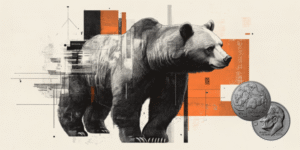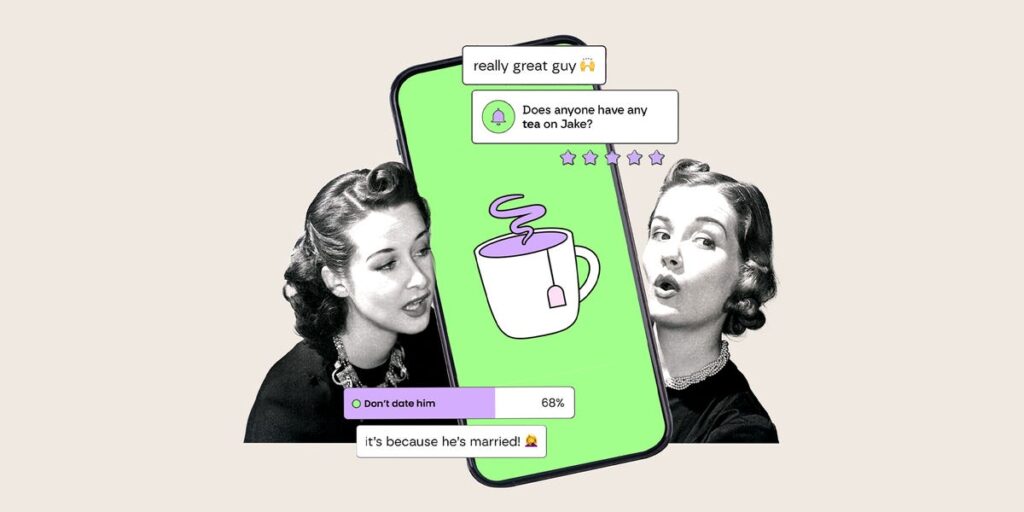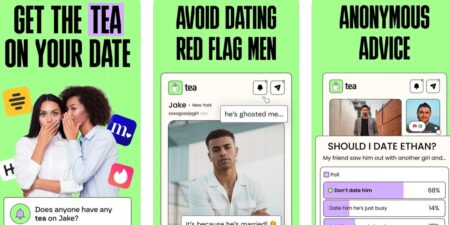If you need evidence that people are so over dating apps, look no further than the App Store, where at one point this week the most popular app was one that claims it can help women navigate dating more safely and weed out the worst guys.
Tea, an app exclusively for women, lets them reverse image search men’s photos, run background checks on potential suitors, and post reviews of men, either deeming them green-flag or red-flag daters. The company website says that “Tea ensures that women have the information they need before meeting someone new,” and was born in 2023 out of the desire of founder Sean Cook, a former product manager at Salesforce, to protect women like his mother, who the site says ran into catfishes and men with criminal records while online dating. Its site boasts that more than 1.6 million women are on the app.
Tea is the commodification of a whisper network — and a digital one that defeats the purpose of indirect, off-the-record communication by encouraging women to leave a written trail of allegations. That spreads the grievances to a large network of people with whom they haven’t established rapport. And it’s not the only one of its kind: there’s also RAW, a dating app that lets women match with men and then give them green, beige, or red-flag ratings, which contribute to the rating on a respect meter that displays on their profiles.
These apps are the startup cousins of “Are We Dating the Same Guy?” Facebook groups, which became hotbeds of gossip on guys and encouraged women to share photos, names, and red flags of men they had dated or matched with on dating apps. Women have also harnessed the power of the TikTok algorithm to call out allegedly bad guys and potential cheaters — last week’s Coldplaygate was only the latest evidence of how easily someone can get spotted misbehaving and how quickly someone’s once-private behavior can become meme fodder for the globe.
The naming and shaming is a trend empowered in part by the ethos of the #MeToo movement, but it is morphing into a dystopian “John Tucker Must Die” sequel. The men put on blast in these groups don’t all rise to the level of sexual abusers, cheaters, thieves, and fake profiles — I’ve been lurking in dating Facebook groups for years and have also seen many women post photos of and accuse men of offenses like messaging too many women and ghosting. Some post about men they match with before even meeting them, seeking intel from any women who may know them. Even West Elm Caleb — who went viral in 2022 as TikTok’s algorithm propelled stories of women complaining about dating him to millions of FYPs — was described as nothing more nefarious than a serial love bomber and boundary crosser. Moving whisper networks into digital spaces raises questions about what qualifies as a red flag; does a person have to be abusive, or were they just a prolific swiper?
The naming and shaming is a trend empowered in part by the ethos of the #MeToo movement, but it is morphing into a dystopian “John Tucker Must Die” sequel.
The Facebook groups and TikTok posts were part of a grassroots movement. Tea is trying to own the moment by bringing the posts under its own umbrella. “Ultimately, this app is another facet of Silicon Valley’s wrongheaded idea that all we need is a tech fix for a societal crisis like gender-based violence,” Lia Holland, campaigns and communications director of the digital rights advocacy group Fight for the Future, tells me in an email. If people really wanted to protect women, Holland says, “these advocates would also be calling to dismantle the digital surveillance state that powers Tea, and for new, digital-age laws that re-establish the basic human right to privacy for all abuse survivors, all activists, and all people.” Tea declined to comment for this story.
Whisper networks have sustained because the traditional systems, like the criminal justice system, colleges, and HR departments sometimes fail to respond effectively to women’s complaints. Dating apps themselves have often failed terribly at removing dangerous men from their pools.
“It’s not any kind of surprise that women would try to alert one another and try to protect one another in whatever ways they can,” says Deborah Tuerkheimer, a professor in the Northwestern University Pritzker School of Law and author of the book “Credible: Why We Doubt Accusers and Protect Abusers.” Even if abusers aren’t formally punished, whisper networks have the effect of preventing some women from engaging with men who could harm them. “There are good things about informal reporting channels,” Tuerkheimer says. But stopping gender-base violence and harassment would require more accountability from our institutions. “Ideally, this would mostly be sort of a transition to a time when we all were more trusting, and had good reason to trust that these institutions would do what they’re designed to do, because there’s a lot that is lost when you have to go online or go to an app and make these allegations.”
Tea advertises itself as a place for “anonymous dating reviews,” but those who post to Tea aren’t as anonymous as users may believe. The company’s privacy policy states that it may share your information to respond to lawful requests and legal processes, and the app collects your birth date, photo, location, and photos of IDs. That could open women who think they’re posting in good faith to defamation suits by disgruntled men whose reputations suffer by what has been posted about them, even if it’s accurate. A man sued Meta and women who posted negative stories about dating him in a Facebook group in Chicago, but a judge tossed the suit out in May. Another man has filed a similar complaint in Los Angeles, prompting the women to start a GoFundMe to cover their legal fees.
Cook, Tea’s founder, said on a podcast in May that the company receives an average of three legal threats a day, and has a legal team to respond. “There’s a whole men’s rights activism community that doesn’t like what we’re doing. And so they’re constantly trying to tear us down,” he said. “We have a lot of people that are unhappy about what we’re doing, and that’s OK with us. We believe this is a public service.”
We’re accustomed to having access to information to quell our anxieties. Little is more anxiety-inducing than getting ready for a first date. Some women have tried to beat that by playing amateur private investigator and digging deep on men before meeting up for a drink. It’s partly driven by wanting to feel secure in a world where women’s safety is always precarious, partly by a desire to optimize their dating lives and crowdsource intel so they don’t waste a night on a red-flag guy. But using selfies to verify someone’s gender — Tea’s method to confirm users are women — doesn’t vet the legitimacy of such complaints. “The fact that anyone from a vindictive ex to some lady on Fiverr can use this app to create false data also deeply undermines its legitimacy,” Holland says. “True predators are smart — they could use the app to get good ‘reviews’ and lure unsuspecting dates with a false sense of security.”
Part of meeting new people is ultimately to assume some level of risk, and dating requires both vulnerability and patience to unravel the nuance of someone’s personality. As the writer Magdalene Taylor wrote on X about Tea: “So many people are treating dating as something to be done defensively and with hostility. The goal isn’t even to find love but to foster ammunition against each other. It’s not about safety, it’s about avoiding humiliation.” Matters of the heart and optimization don’t mix.
Modern dating is, without a doubt, a minefield. There are catfishing scammers and real-life abusers. Women who were murdered are more likely to have been killed by a romantic partner than a stranger, family member, or friend. It is obvious to say that dating can be dangerous for women, and it is noble in theory to try to do something about it. Online whisper networks may protect some women from being harmed by men. But no one can fully insulate themselves from the possibility of heartbreak, the potential to be lied to or scammed or cheated on, or worse. These digital spaces put the work on women to weed out the bad men — when the solution to the crisis is to drive real, societal change that disincentives such toxic and harmful behavior by men. But real change to the dating world starts with education, empathy, and disincentivizing bad behavior by men, not just making women play cop online.
Amanda Hoover is a senior correspondent at Business Insider covering the tech industry. She writes about the biggest tech companies and trends.
Business Insider’s Discourse stories provide perspectives on the day’s most pressing issues, informed by analysis, reporting, and expertise.
Read the full article here
















